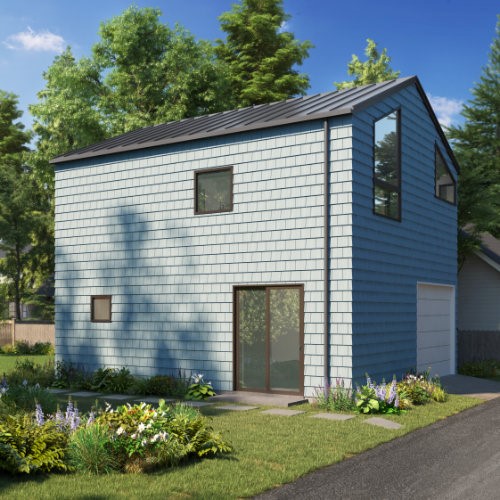Published on:
With backing from some prominent business executives, an architect and founder of a systems-design consultancy launched a new company to increase housing options and help solve Seattle’s affordability challenges.
Citing King County data indicating it needs 244,000 units of affordable housing over the next decade to align supply with demand, the founder-CEO of Hatchback Cottages believes his company can provide Seattle homeowners with a turnkey solution for backyard cottages. The venture-backed company secured a second round of funding in late July.
“We’re helping thousands of homeowners access the hidden value of their existing properties – all while participating in the housing economy,” said Shannon Loew, CEO at Hatchback Cottages. “It’s double-bottom-line real estate – increasing rental supply while stabilizing homeowners and communities.”
Single-family zoning makes up two-third of Seattle’s land area, but an estimated 95,000 of the city’s homeowners could add a cottage under current code, according to Loew. The process is difficult due to barriers to entry that include complicated financing, cost overruns, and the complexity of managing construction.
Hatchback addresses such barriers with a robust web application that helps homeowners understand the economics, aligns financing, and offers an array of designs that complement the character of Seattle’s various neighborhoods. Additionally, the company handles the entire permitting and construction process.
The company is currently working on six projects with plans to break ground on the first one in September.
Adding a Detached Accessory Dwelling Unit (DADU) to a homeowner’s backyard is a powerful way to unlock a property’s potential, according to Hatchback’s website, which shows various scenarios for generating cashflow and equity.
Based on a homeowner’s goals, the app can help build a tailored financial forecast to help clients decide whether to build a cottage to rent out. The company’s analytics suggest the average homeowner who rents a Hatchback Cottage could reduce their housing costs by 20% and grow equity 50% faster.
The company has relationships with various lenders, enabling customers to consider different debt products.
“This is a disruptive solution that will have significant impact on our region’s housing supply problem, responding to the new ways we are all thinking about our homes given the current context,” stated Peter Orser, former CEO at Weyerhaeuser Real Estate, and one of Hatchback’s backers.
Hatchback currently offers three styles of cottages, each with two sizes. Sizes range from around 500 to 1,000 square feet. All solar-ready designs can accommodate flexible uses over time and promise sustainability with 75-year construction quality that meets Built Green 4-Star standards.

The “Rhodi” features an open galley kitchen, walk-in pantry, and laundry room,13′ ceiling, garage, and exterior shingle cement siding.
Rendering courtesy of Hatchback Cottages
Base cost of the cottages is estimated to range from $225,000 to $299,000 (excluding taxes and fees). “In total, homeowners have that complete turnkey delivered solution with all that intelligence and the work done for them for somewhere between $325,000 and $399,000,” Loew stated in a recent interview with a reporter from Puget Sound Business Journal.
In addition to Orser, other backers include Ron Sher, who redeveloped Crossroads Shopping Center, Dale Sperling, former CEO at Unico Properties and founder of OneBuild, social impact investor Pete Miller, former Microsoft attorney, and Nathan Every, M.D., general partner at Frazier Healthcare Partners.
“What I love about this business is how easy it makes the process for the homeowner,” offers Ron Sher. “In seconds, Hatchback shows them the financial benefits and construction feasibility. And then handles the whole construction process with no aggravation or hassle.”
Loew spun Hatchback out of FIX Impact Development, which he founded in 2008 “to solve complex urban challenges with place-based solutions.” He has worked with leading organizations and designers in Europe and Africa. The Seattle resident has chaired the Seattle Design Commission and was an Affiliate-Fellow of the UW Runstad Center for Real Estate, among numerous affiliations.
Loew said prefab construction is a future goal. He also envisions expanding elsewhere in the Puget Sound region “pretty quickly” and believes the concept can be rolled out nationally.